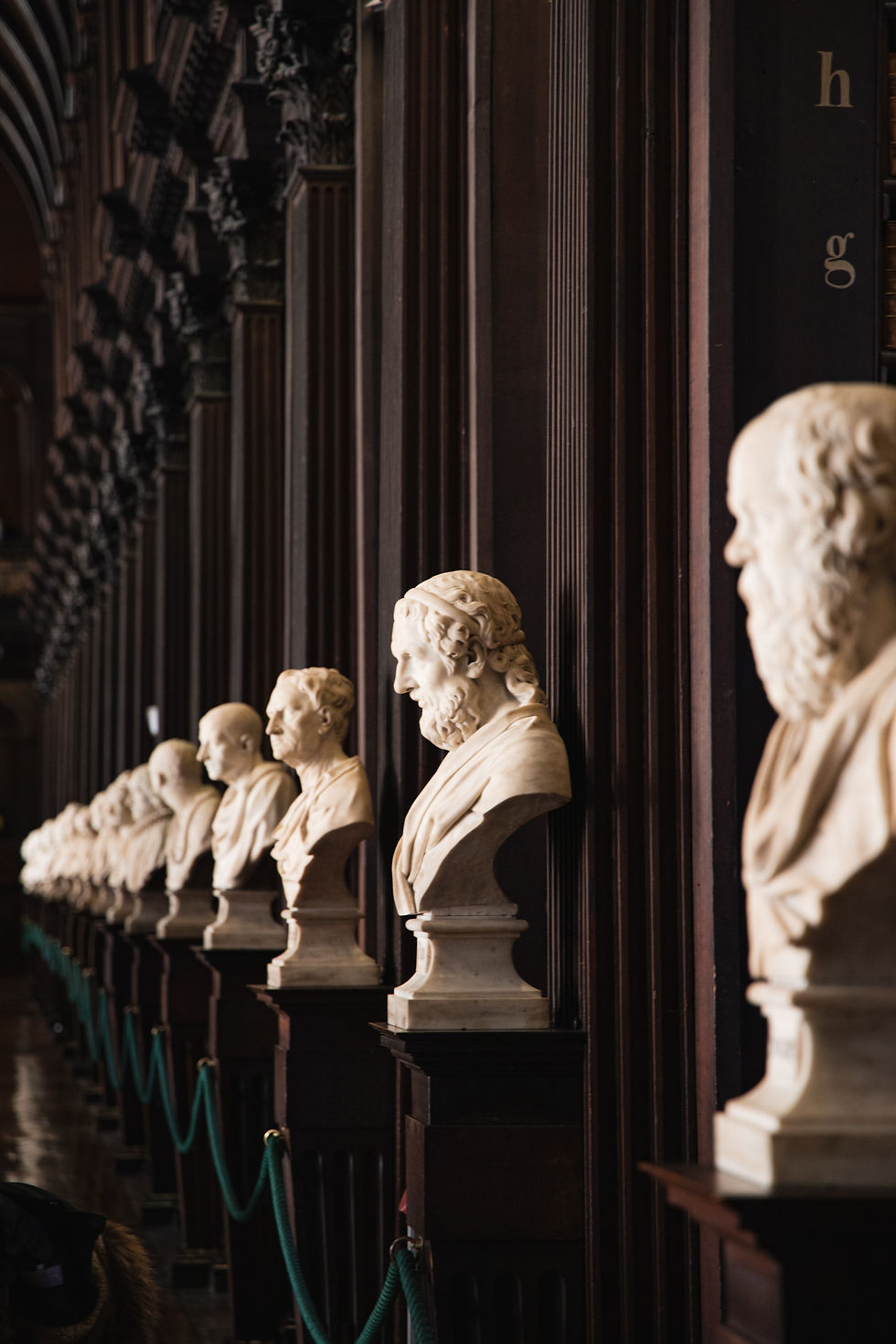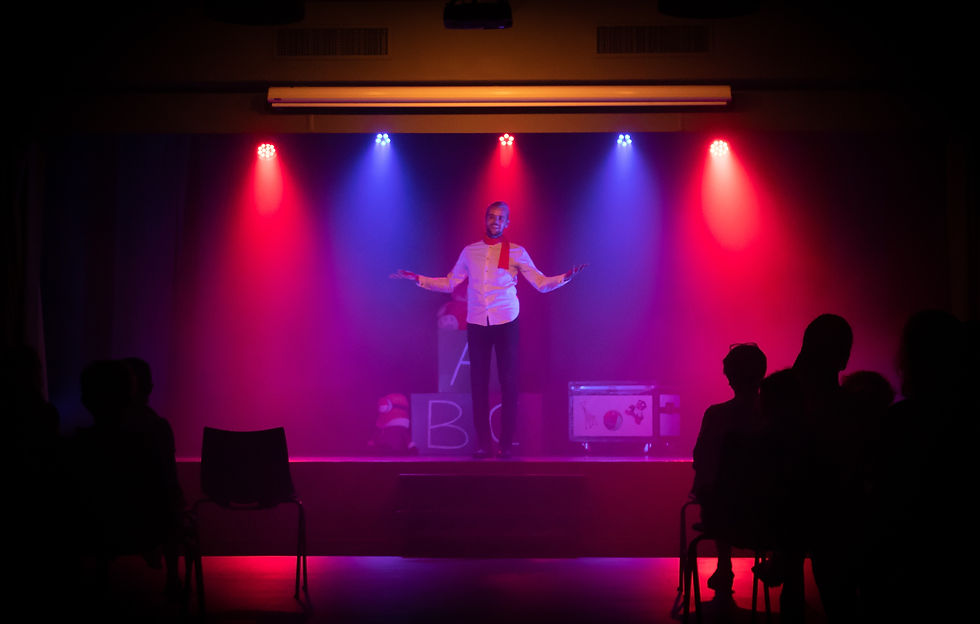The Invisible Art of Leadership: Holding the Field
- Kinsey Hartwell
- 12 mei
- 4 minuten om te lezen
What masterful facilitators, speakers, and leaders do - without anyone quite knowing how.

You’ve probably felt it before.
You walk into a room. The meeting hasn’t started yet, but something shifts.
A person enters. They don’t speak loudly. They don’t demand attention.
But the energy changes.
It settles.
It sharpens.
It opens.
Suddenly, people are more present.
More connected.
More alive.
That person`- whether they’re leading the team, facilitating the process, or guiding the dialogue- is doing something extraordinary.
They are holding the field.
And while it may seem like magic, it’s not a trick.
It’s a skill.
A practice.
An energy of leadership that transcends strategy, structure, or words.
Let’s explore what it really means to hold the field, and what qualities make certain leaders feel like hypnotists, magicians, or modern-day mystics without ever leaving reality.
WHAT DOES IT MEAN TO “HOLD THE FIELD”?
“Holding the field” is a phrase used often in facilitation, systems coaching, and energetic leadership, but it’s rarely explained clearly.
So, let’s define it:
Holding the field is the invisible leadership act of stabilizing the emotional, energetic, and relational space - so that trust, depth, dialogue, and transformation can unfold.
It’s like being the invisible bowl around the conversation.
The container.
The grounded presence that allows everything else to happen.
It’s not just about what you say.
It’s about who you are being, and how others feel in your presence.
It’s presence.
It’s attention.
It’s a felt sense of safety and invitation, without control.
THE LEADER AS MAGICIAN, HYPNOTIST, OR ALCHEMIST
Leaders who hold the field well often feel otherworldly.
Not because they’re supernatural, but because they’re tuned into something deeper than most people are used to.
They embody:
Stillness without stagnation
Focus without force
Confidence without ego
Invitation without manipulation
Spaciousness without chaos
They’re not casting spells.
They’re casting attention.
They’re not hypnotizing people into agreement.
They’re inviting people into presence.
They’re the facilitator who reads the unspoken.
The panel host who brings out the gold in each voice.
The leader who says little but makes everyone feel seen.
The coach who asks one question, and the room falls silent in awakening.
They don’t overpower the moment.
They partner with it.
WHAT ARE THESE LEADERS ACTUALLY DOING?
Let’s make the invisible visible.
Here are some of the skills and inner stances great field-holders bring:
Grounding Their Own Energy First
Before leading others, they lead themselves.
They arrive grounded.
Rooted.
Not rushing in from another fire.
Not multitasking mentally.
They’re here. With you. Fully.
They regulate the space by regulating themselves.
Reading the Room Subtly
They don’t just listen to what’s said.
They listen to what’s not said.
They notice tension, emotion, withdrawal, curiosity - often before it’s verbalized.
Their awareness is panoramic.
Becoming the Bowl, Not the Spoon
They don’t stir the pot for the sake of action.
They become the bowl that holds the ingredients.
They create safety and permission - then let emergence happen.
They know:
Containment is power, not control.
Holding Polarities Without Needing to Fix Them
Where others rush to solve or simplify, they stay centered.
They can hold:
Conflict without collapsing.
Emotion without absorbing.
Silence without awkwardness.
Complexity without needing quick clarity.
This is emotional agility in motion.
Sensing the System, Not Just the Individuals
They sense the whole field: the team, the culture, the history, the tension, the unspoken agreements.
They don’t just facilitate tasks.
They facilitate transformation, because they’re attuned to the system’s deeper pulse.
WHAT DOES IT FEEL LIKE WHEN SOMEONE HOLDS THE FIELD?
Ask yourself:
Have you ever felt unexpectedly safe in a conversation?
Have you ever opened up more than usual without quite knowing why?
Have you ever been in a room where everyone felt more intelligent, connected, and honest just because one person was present?
That’s it.
That’s the feeling of a field being held.
It’s not charisma.
It’s not performance.
It’s energetic integrity.
ARE LEADERS BORN WITH THIS SKILL?
Some are naturally more intuitive.
More empathetic.
More aware of group dynamics.
But any leader can learn to hold the field more consciously.
It starts with:
Stillness
Deep listening
Inner clarity
Spaciousness
A commitment to serve the space - not dominate it.
It’s not a “stage presence.”
It’s a sacred presence.
What Happens When No One Holds the Field?
Chaos.
Talking over each other.
Surface-level answers.
Confusion.
Power struggles.
Energy leaks.
In teams, it shows up as:
Fragmentation
Burnout
Apathy
People not feeling heard - even if they speak all the time
Without the field being held, the potential of the group leaks out the sides.
THE NEW LEADERSHIP SUPERPOWER
Holding the field may not show up on a KPI report.
It may never appear in a job description.
But in the moments that matter?
It’s the skill that determines whether transformation happens, or doesn’t.
In adaptive leadership, systems change, coaching, and facilitation work - this is the invisible thread that holds everything together.
And it’s not flashy.
But it’s felt.
Deeply.
Immediately.
FINAL REFLECTION
We’ve been trained to believe that leadership is about driving action, commanding attention, or having the best ideas.
But the next generation of leaders?
They don’t drive, command, or perform.
They hold space.
They create room for insight.
For emergence.
For truth.
For shared humanity.
They become bowls. Anchors. Vessels.
The ones who carry the moment without having to carry the spotlight.
They are the quiet magicians.
The grounded alchemists.
The ones who change everything, without forcing anything.
So the next time you walk into a room, ask yourself:
What field am I creating by how I show up?
What might become possible- if I choose to hold it?
And then - don’t overthink it.
Because the magic of holding the field doesn’t come from control.
It comes from presence. From embodiment.
From becoming one with the moment, not trying to manage it.


